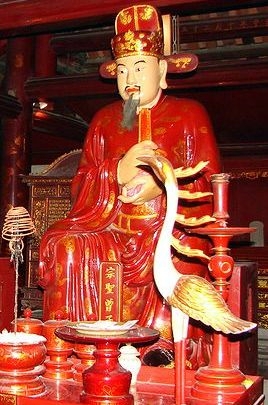
Content created: 2011-08-08
File last modified:
Go to English only display.

The Great Learning (Dà Xué 大学) has long had independent status as the shortest work in the Confucian Canon, although it is also a chapter in the Book of Rites (Lǐ Jì 礼记), one of the longest works in the Canon.

Although Chinese have traditionally attributed these texts to Confucius, the consensus today is that they were not written by him, but that they closely represent his views and his ways of reasoning. The author is now believed to be Zēng Shēn 曾参 (also pronounced Zēng Cān), who is often referred to as "Master Zēng" or Zēngzǐ 曾子) and to whom a lengthy supplementary commentary has always been attributed.
This page provides the whole of the Great Learning, reproduced from the classic scholarly translation published by James Legge in The Chinese Classics (1893-1895 ). (For an annotated listing of the contents of the Confucian Canon, click here.) In his original publication, Legge accompanies the text by extensive notes, and follows it with the traditional commentary attributed to Zēng Shēn. These materials are omitted here.
(A more complete on-line file that includes the commentary may be had from Chinese Classics & Translations. For the commentaries, click on "Zengzi's comments on illustrious virtue" &c. at the top of the page on that site.)
| Great Learning |
大学 Dà Xué 大學 |
| 1. What the Great Learning teaches is: to illustrate illustrious virtue; to renovate the people; and to rest in the highest excellence. |
大学之道在明明德,在亲民,在止于至善。 Dàxué zhī dào zài míngmíng dé, zài qīnmín, zài zhǐyú zhì shàn. 大學之道在明明德,在親民,在止於至善。 |
| 2. The point where to rest being known, the object of pursuit is then determined; and, that being determined, a calm unperturbedness may be attained to. |
知止而后有定;定而后能静; Zhī zhǐ érhòu yǒu dìng; dìng érhòu néng jìng; 知止而后有定;定而后能靜; |
| 3. To that calmness there will succeed a tranquil repose. In that repose there may be careful deliberation, and that deliberation will be followed by the attainment of the desired end. |
静而后能安;安而后能虑;虑而后能得。 Jìng érhòu néng ān; ān érhòu néng lǜ; lǜ érhòu néng dé. 靜而后能安;安而后能慮;慮而后能得。 |
| 4. Things have their root and their branches. Affairs have their end and their beginning. To know what is first and what is last will lead near to what is taught in the Great Learning. |
物有本末;事有终始。知所先后,则近道矣。 Wù yǒu běnmò; shì yǒu zhōngshǐ. Zhī suǒ xiānhòu, zé jìndào yǐ. 物有本末;事有終始。知所先後,則近道矣。 |
| 5. The ancients who wished to illustrate illustrious virtue throughout the kingdom, first ordered well their own States. |
古之欲明明德于天下者,先治其国; Gǔ zhī yù míngmíng dé yú tiān xià zhě, xiān zhì qí guó; 古之欲明明德於天下者,先治其國; |
| 6. Wishing to order well their States, they first regulated their families. Wishing to regulate their families, they first cultivated their persons. |
欲治其国者,先齐其家;欲齐其家者;先修其身; Yù zhì qí guó zhě, xiān qí qí jiā; yù qí qí jiā zhě; xiān xiū qí shēn; 欲治其國者,先齊其家;欲齊其家者;先修其身; |
| 7. Wishing to cultivate their persons, they first rectified their hearts. Wishing to rectify their hearts, they first sought to be sincere in their thoughts. |
欲修其身者,先正其心;欲正其心者,先诚其意; Yù xiū qí shēn zhě, xiānzhèng qí xīn; yù zhèng qí xīn zhě, xiān chéng qí yì; 欲修其身者,先正其心;欲正其心者,先誠其意; |
| 8. Wishing to be sincere in their thoughts, they first extended to the utmost their knowledge. Such extension of knowledge lay in the investigation of things. |
欲诚其意者,先致其知;致知在格物。 Yù chéng qí yì zhě, xiān zhì qí zhī; zhìzhī zài géwù. 欲誠其意者,先致其知;致知在格物。 |
| 9. Things being investigated, knowledge became complete. Their knowledge being complete, their thoughts were sincere. |
物格而后知至。知至而后意诚。 Wù gé érhòu zhī zhì. Zhī zhì érhòu yì chéng. 物格而后知至。知至而后意誠。 |
| 10. Their thoughts being sincere, their hearts were then rectified. Their hearts being rectified, their persons were cultivated. |
意诚而后心正。心正而后身修。 Yì chéng érhòu xīn zhèng. Xīn zhèng érhòu shēn xiū. 意誠而后心正。心正而后身修。 |
| 11. Their persons being cultivated, their families were regulated. Their families being regulated, their States were rightly governed. |
身修而后家齐。家齐而后国治。 Shēn xiū érhòu jiā qí. Jiā qí érhòu guó zhì. 身修而后家齊。家齊而后國治。 |
| 12. Their States being rightly governed, the whole kingdom was made tranquil and happy. |
国治而后天下平。 Guó zhì érhòu tiānxià píng. 國治而后天下平。 |
| 13. From the Son of Heaven down to the mass of the people, all must consider the cultivation of the person the root of everything besides. |
自天子以至于庶人壹是皆以修身为本。 Zì tiānzǐ yǐzhìyú shùrén yīshì jiē yǐ xiūshēn wéi běn. 自天子以至於庶人壹是皆以修身為本。 |
| 14. It cannot be, when the root is neglected, that what should spring from it will be well ordered. |
其本乱而末治者,否矣; qí běn luàn ér mē zhì zhě, fǒu yǐ; 其本亂而末治者,否矣; |
| 15. It never has been the case that what was of great importance has been slightly cared for, and, at the same time, that what was of slight importance has been greatly cared for. |
其所厚者薄,而其所薄者厚,未之有也。 qí suǒ hòu zhě báo, ér qí suǒ báo zhě hòu, wèi zhī yǒu yě. 其所厚者薄,而其所薄者厚,未之有也。 |